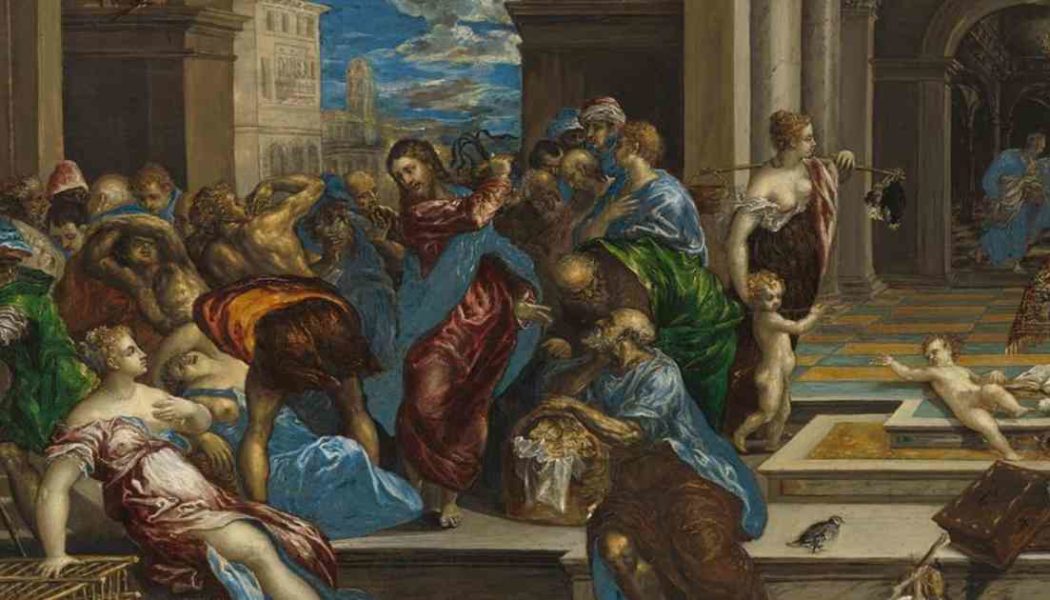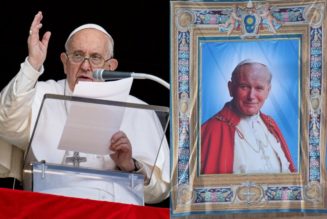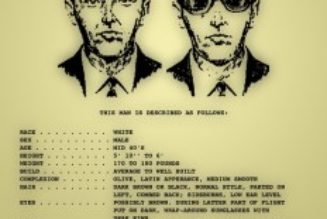
Your body is a Temple and Jesus wants you to drive the greed and self-love out of it this Lent.
There is a lot going on beneath the surface in the cleansing of the Temple story we hear on the Third Sunday of Lent (Year B). Ultimately, though, it is meant to drive home the point that Lent demands a violent cleansing of your soul in order to aggressively restore it to its true purpose.
In the passage we hear from the Gospel of John, Jesus goes to the Temple and he doesn’t like what he sees.
“Jesus went up to Jerusalem,” begins Sunday’s Gospel. “He found in the temple area those who sold oxen, sheep, and doves, as well as the money changers seated there.”
He reacts with angry violence.
“He made a whip out of cords and drove them all out of the temple area.” Sheep and oxen bolt and coins clatter to the floor as Jesus hurls the tables over, shouting, “Take these out of here, and stop making my Father’s house a marketplace.”
John quotes Psalm 69: “Zeal for your house will consume me.” “Consume” is a dramatic verb. It is as if God is obsessed with his house. Because he is.
Why? John later wrote about the Temple in the Book of Revelation. In Chapter 11, we are told that the “Ark of the Covenant,” the heart of the Temple, is about to appear in heaven. When it does, in Revelation 12, it looks like Our Lady of Guadalupe, a woman pregnant with the presence of God for mankind, and angels revolt and must be driven out.
After that heavenly prehistory, all of Eden is depicted as a Temple, a place like the garden of the Song of Songs where God can meet us in love, until Adam and Eve spoil it and must be driven out. In fact, Second Kings tells us taht the Temple of Solomon itself was was adorned with depictions of palm trees, lilies, and pomegranates — fruits of the vine — crawling up the main pillars. There are carvings of lions and oxen, and the supernatural creatures of heaven above, angels living in harmony with all things, guarding the temple like they did the Garden of Eden.
Each Gospel reading so far this Lent can be seen in light of this: In the First Sunday of Lent Year B, the flood cleansed the earth to restore Eden, if only temporarily, and we met Jesus with the animals facing Temptation in the desert, recapitulating Adam and Eve’s encounter with Satan, only with a different result. In the Second Sunday of Lent, the Transfiguration previewed what earth-as-Temple will look like in the future, after the Resurrection, at the culmination of Salvation history when our bodies will be glorified.
That high vision of the Temple is what is at stake on this Fourth Sunday of Lent Year B, when Jesus sees his Temple defiled.
We learn that when we spoil the place where he wants to meet us, God gets angry. Violently angry. What was supposed to be a place of pilgrimage and self-giving had become a place of profiteering and self-seeking. Worse, it was all happening in the part of the Temple set aside for Gentiles to worship, crowding them out.
That makes Jesus furious, and he can’t tolerate it.
Jesus begins here to reveal his master-plan for the restoration of right worship on earth.
“Destroy this temple and in three days I will raise it up,” Jesus says. The leaders find this statement absurd. “But he was speaking about the temple of his body,” the Gospel tells us.
Why? Because the Temple is the dwelling place of God with man. It is the place we can meet him in love. But Christ himself is “greater than the temple,” the ultimate Emmanuel, God-with-us. After the Resurrection, John realized, there is a new place God dwells with us: the body of Christ, the company of those who partake in the Eucharist, uniting with him; the Church.
Origen of Alexandria, a third-century Father of the Church said, “Both the Body of Jesus and the temple seem to me to be a type of the Church, which with lively stones is built up into a spiritual house, into a holy priesthood.”
John would have also understood that, through Jesus, the whole world was becoming a Temple. It was John who reported Jesus’s words to the woman at the well. She was a Samaritan who believed Mount Gerizim, not the Temple, was the place to worship God. Jesus tells her, “The hour is coming when neither on this mountain nor in Jerusalem will you worship the Father. … [T]he hour is coming, and is now here, when true worshipers will worship the Father in Spirit and truth; and indeed the Father seeks such people to worship him.”
That hour came with Jesus’s destruction on the cross which “presaged the destruction of the Temple,” says the Catechism, bringing “the dawning of a new age in the history of salvation,” where God can be worshiped everywhere.
Jesus saw himself as greater than the Temple, the meeting place of God and man, because he is God, and we walk with God like Adam and Even in the Garden now through our friendship with him.
Paul would develop this idea further, calling the Church “the temple of the living God” and telling us each that “your body is a temple of the Holy Spirit within you.”
The logic is this: Christ is the new Temple; we are the body of Christ through the gift of the Spirit; therefore we are temples.
That means we each have a job to do: Cleanse our temple. That’s what Lent is for.
How to cleanse your temple? Make a whip out of cords and overturn the tables of your sin. Then, allow God to restore his image to its proper place.
The first reading is the Ten Commandments, and it explains what to do in your soul. The first three are commandments to demolish the ways we are defiling the Temple.
“I, the Lord, am your God” it begins. Then come the first three commandments:
- “Have no other gods besides me.” Tear down your idols, those parts of you that treat career, entertainment, comforts, money, and popularity as more important than God.
- “You shall not take the name of the Lord, your God in vain.” Stop using his Temple, your body, to profane God.
- “Remember to keep holy the sabbath day.” Get violent with the money changers in your heart that have intruded on the Lord’s Day, Sunday. Overturn their tables. Clear them out.
Put the image of God up in the place of your idols and keep it there, by treating others as they deserve.
- “Honor your Father and Mother.” Serve the image God in your own family first.
- “You shall not kill.” Do not destroy the image of God by violence or anger — in word, thought, or deed.
- “You shall not commit adultery.” Do not turn the image of God in other people into an object of your base desire for pleasure — in your body, mind, or eyes.
- “You shall not steal.” Always give to those God loves, never take — and stop stealing from the poor what rightly belongs to them.
- “You shall not bear false witness.” Speak of people as if they were icons of God, because they are.
- “You shall not covet your neighbor’s wife.” Stop disrespecting God by demeaning the family he gave you.
- “You shall not covet your neighbor’s possessions.” Stop showing ingratitude to God for his generous providence.
Lent is a special time you need to root out what Vatican II called your “deranged self-love” in order to “be purified and perfected by the power of Christ’s cross and resurrection.”
It should hurt a little to do that. Or, more likely, a lot.
St. Paul says in the second reading that Jesus Christ crucified is “a stumbling block to the Jews and foolishness to Gentiles,” but that “the foolishness of God is wider than human wisdom, and the weakness of God is stronger than human strength.”
The work of Lent is to apply that foolishness over and over again to the things we have put God’s rightful place. Then, after Easter comes the resurrection, restoring us as a Temple, a dwelling place with God.









